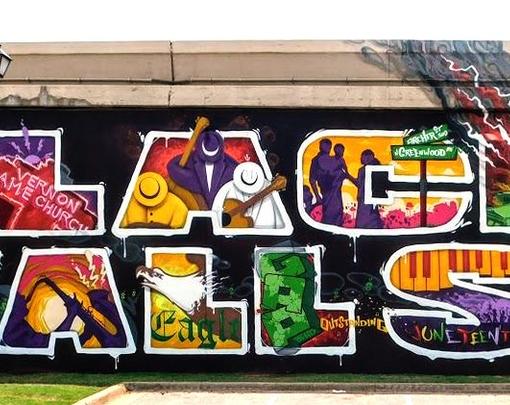Geoff Holland, editor of The MAHB Dialogues, a project of the Millennium Alliance for Humanity and the Biosphere at Stanford University, asked Laura Flanders, host of The Laura Flanders Show and a fellow of The Next System Project, and Isaiah J. Poole, editorial manager of The Next System Project, to answer a series of questions about the current state of the news media and how a news media could emerge that better serves the needs of a society in crisis. The questions and their co-written answers were first published by the MAHB Blog.
Some people have characterized the global media, particularly social media, as the nervous system of humanity. Is that how you see it, and if so, why is that an apt description?
Before the internet, humanity already had a nervous system: real friends, next-door neighbors, librarians, schoolteachers, beat reporters and local media from the town crier to local papers, and TV and radio stations. Many of those have taken a hit with the rise of globalized media and social platforms. That’s not to say that there aren’t examples of global media serving the public good. Today, news spreads in minutes that once would have taken days or even months. Pictures of koalas caught in bushfires, kids killed by cops or news of epidemics speed around the globe. Still, there’s no denying that the internet, that once promised to connect people, peer to peer, across borders, without hierarchy or control, has instead given rise to concentrated monopolies with no transparent code of ethics and a vested interest in mass manipulation, surveillance and what can amount to mind-control. The problem is with the business model rather than the DNA of today’s media technology, but the dismal effects on human relations and the health of society are apparent everywhere.
If the world’s media does function like a civilization-scale nervous system, why isn’t it doing a better job of informing and inspiring collective action against such existential threats as human overpopulation, climate change, and the rapacious overexploitation of our Earth’s resources?
Many journalists and some media outlets work valiantly to document and call attention to the world’s many crises, but the odds they’re up against are huge. Mercenary media owned by vast for-profit corporations are directly invested in consumerism, competition, and short-term thinking, not cooperation or the health of the world. That’s largely because the algorithms that drive up ratings and advertising revenue reward extremism, sharp contrasts, and shock. “Engagement” with this content is valuable for ads—and underwriting. It’s disastrous for the social fabric. This is the calculus that brought us an election campaign in 2016 in which Donald Trump dominated all the networks and received more than twice as much airtime as Hillary Clinton and 10 times as much as Bernie Sanders.
Our political system is deeply corrupted by bankers, billionaires, and multinational corporations, who use their money and influence to buy politicians to deliver laws and public policy that put profit over people and planet. Is transformative change possible when this kind of corrosive influence is so prevalent?
The same media corporations that have sold generations of people on competition, consumerism, fossil fuel extraction, and war are underwritten by multinational corporations that stand to profit from all those things. With respect specifically to our political system, reporting on our pay-to-play elections is brought to us by pay-to-play media. Stripped for assets and short on cash, even news divisions are expected to turn a profit. It’s no surprise then that the same media companies that receive the vast majority of spending on campaign advertising and ads rarely report on the corrosive impact of money in politics. That money keeps cable news, especially, afloat. Public interest, not-for-profit media can offer alternatives and shine a light on strategies for making a difference, but public media have no in-built source of revenue and rely on large donors, underwriters and—in the case of public TV and radio—congressional appropriations. Vilified by the right and outgunned by corporate lobbyists, public interest groups have a hard time defending funding for noncommercial media or persuading Congress to enforce antitrust rules. The path to a changed democracy rests on a changed media. It’s a Catch-22.
Currently, a handful of massively powerful corporations, including Google, Facebook, and Murdoch’s News Corporation, own and control most of the global media. Is this unhealthy? If so, why?
There’s no debating the dangers posed by the concentration of power and wealth in the hands of a few corporations. In the media sphere, that power not only tells the news, but IS the news. In the last 50 years, Rupert Murdoch-owned media outlets—including the Fox News Channel in the U.S. and newspapers in Great Britain and Australia— successfully moved an ideological agenda and shifted debate in those countries towards deregulation, neoliberalism and the Right. The 21st-century media titans look set to have even more power. Today’s biggest corporations like Alphabet (Google’s parent company), Amazon, Facebook, and Microsoft are the most valuable companies in the world. In the market, the data they trade in is more highly valued than gold. They are dangerous, not only because they make their profits off human data and creativity, giving the public nothing—or worse than nothing—back, but because of their capacity to surveill and control. They are commercially invested in protecting their own secrecy and that of their users—whoever they may be—and are a proven resistance to government regulation or accountability. As Carole Cadwalladr of the Guardian has said, society can either have vast, unaccountable proprietary corporations controlling our digital space, or we can have democracy, but not both.
The current media model depends largely on revenue streams fueled by paid advertising from corporations. Given this, it seems the media giants are focused primarily on selling consumer influence rather than being honest and unbiased purveyors of news and information to the public. What can be done about this by the general public?
The media most people turn to, to cover the people, issues and policy debates in the news, are owned by a handful of massive global corporations with a direct financial interest in the outcome of those debates. Changes in technology and the advertising marketplace have made it more apparent than ever that objective news reporting, particularly local and
state-level news, cannot rely on the revenue models that worked through much of the 20th century. It is time to consider shifts to a greater reliance on public funding, perhaps a public media tax on private advertising (as in the Netherlands) or a public media “voucher” every taxpayer could claim to support the nonprofit media outlet of their choice (the so-called Baker tax). In addition to shoring up public media large and small, we need to see government support, including small business assistance for media institutions that operate via cooperative and other public interest structures. Local ownership, worker ownership, employee-and-consumer shared ownership models exist that ensure both adequate editorial resources and editorial independence. We need to study and assess them and invest in what works.
How do we remake media outlets so that they function as trustworthy brokers of unbiased information?
The promise of technology was that it would allow the democratization of information dissemination—individuals and groups could use new online tools to compete with media outlets not serving the public interest. But the failure of public policy to rein in media consolidation, and the monopolization of the internet by a small group of media giants, have all but extinguished that dream. Yet there remain media outlets that are grounded in the mission of being trustworthy presenters of fact and honest purveyors of many perspectives and analysis. These outlets need the space to thrive and to rebuild a culture in which the public itself is compelled to marginalize the purveyors of hate and falsehood. We need to map media assets as vital public assets and map our communities to protect what’s working and work to fill the gaps.
Net neutrality has become a political football in recent years. How is net neutrality critical to the unfiltered delivery of information to the public?
It should be a fundamental principle that the conduits of information not have the power to determine what information is delivered. We would immediately recognize the unfairness of a toll road that charged Chevy drivers a cheaper toll than Ford drivers—especially if the road was owned by Chevy or Ford! Yet that is exactly the scenario we face when net neutrality is not publicly enforced. Companies like Comcast and AT&T, which own cable and broadband pipelines as well as networks that rely on those distribution networks, have every interest in privileging content they own over that produced by their competitors. Promises by companies such as Comcast and AT&T to not engage in such anticompetitive content are just that—promises that mean nothing without the ability of the public to hold them accountable. That is why many communications activists believe that broadband pipelines should operate as a public utility to treat all content equally and fairly, regardless of its source.
The high standards of professional integrity that have historically characterized the journalism profession are today being compromised by news outlets that apply a substantial slant to their reporting. How do we restore public trust in the media?
The journalism profession has always been characterized by a mix of institutions committed to high journalism and public service standards and institutions corrupted by greed, racism, sexism, and deference to money and power. Many people have been poorly served, left out, and marginalized. In recent times, our media have spectacularly failed as our early warning system; failing to warn us of financial collapse, the rise of white militants, misogynist predators, ecological disaster, and the likely blowback effects of our wars abroad. All types of people have good cause to have mistrust, but that is not to say that individual journalists haven’t also risen to the occasion and done their job. If ever there was a time to build broad support for redefining journalism as a public good, this is that moment. The problem is less a matter of “slant” and more a problem of media power concentrated in the hands of a few and media run to protect the interests of those few at the expense of everyone else. Reversing this is not just the job of media, but is also the job of other social institutions. For example, schools should give students tools for civic engagement and critical thinking. Government, while rightly not in the business of regulating speech, should nonetheless ensure that no one set of people gets to hog the megaphones of democratic discourse. One way to do that is to ensure that media ownership is diverse and local. Community institutions can also play a role in ensuring their members have accurate information about their communities, the nation and the world. There is a role for the public, too. News deserts are as dangerous as any other kind. Could we see a healthy-media movement develop along the lines of the movement for healthy food? Having sounded the alarm about media consolidation, its power and the danger it poses, we need to shift the culture to appreciate local, accountable, public-interest media as many have educated themselves about the agricultural ecosystem and embraced farm-to-table food.
Can the media inspire us to better fulfill our responsibility to restore and protect our land and oceans as they have been given to us, and to embrace sustainable, life-affirming alternatives to systems that drive overdevelopment and overconsumption?
We have seen numerous examples of how the power of storytelling has opened the minds of ordinary people to the consequences of the systems they live in and have galvanized change. That is particularly true when these stories are allowed to be heard and seen amid the commercial and ideological noise of status-quo preservers. What is needed is for this type of storytelling to have the same level of time and space now devoted to talking-head ideological slugfests and lowest-common-denominator programming.
How can the media encourage the world’s peoples to embrace their common humanity and see themselves as planetary citizens, as part of the process of shaping a sustainable future?
Media outlets can better focus on bringing us together as a people to solve our common problems when they are freed from the pressures of having to build audiences for corporate advertisers at the lowest possible cost. Serious investigation of such issues as the climate crisis requires the ability to take risks and offend the powerful—the very abilities that have set the conditions for the transformative stories that put corrupt politicians in jail, led to the addressing of injustices and the elimination of threats to public health and well-being. The good news is that we have dedicated writers, editors, photographers, videographers and documentarians prepared to take these risks and tell these stories. We just need the environment that frees them.





